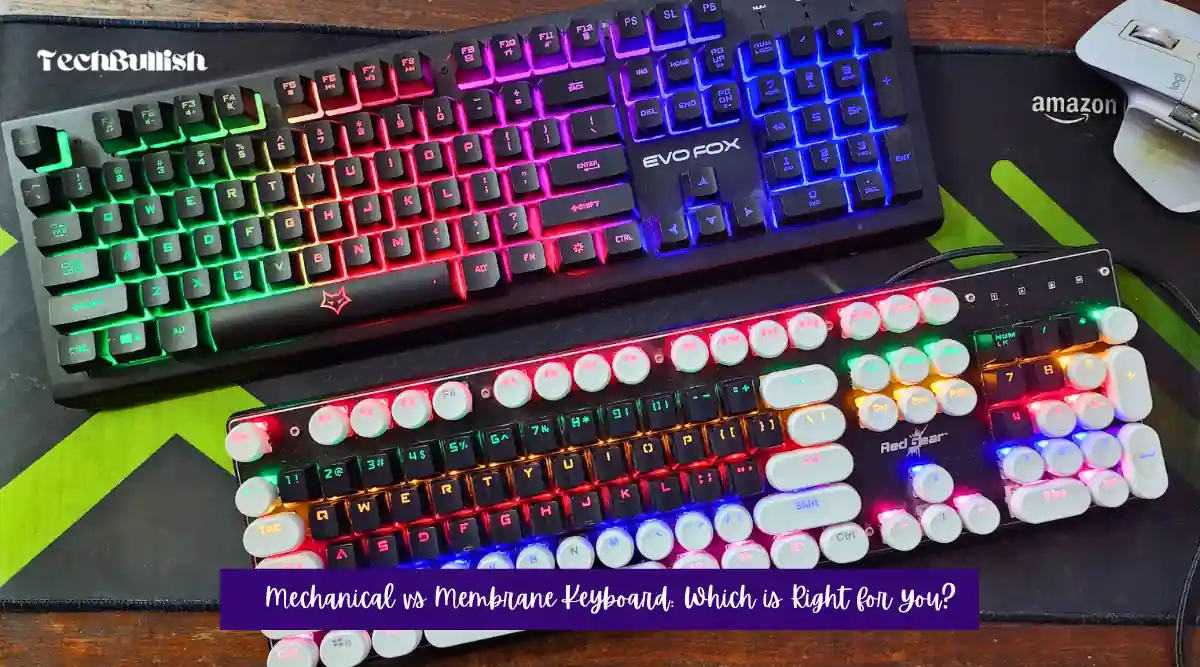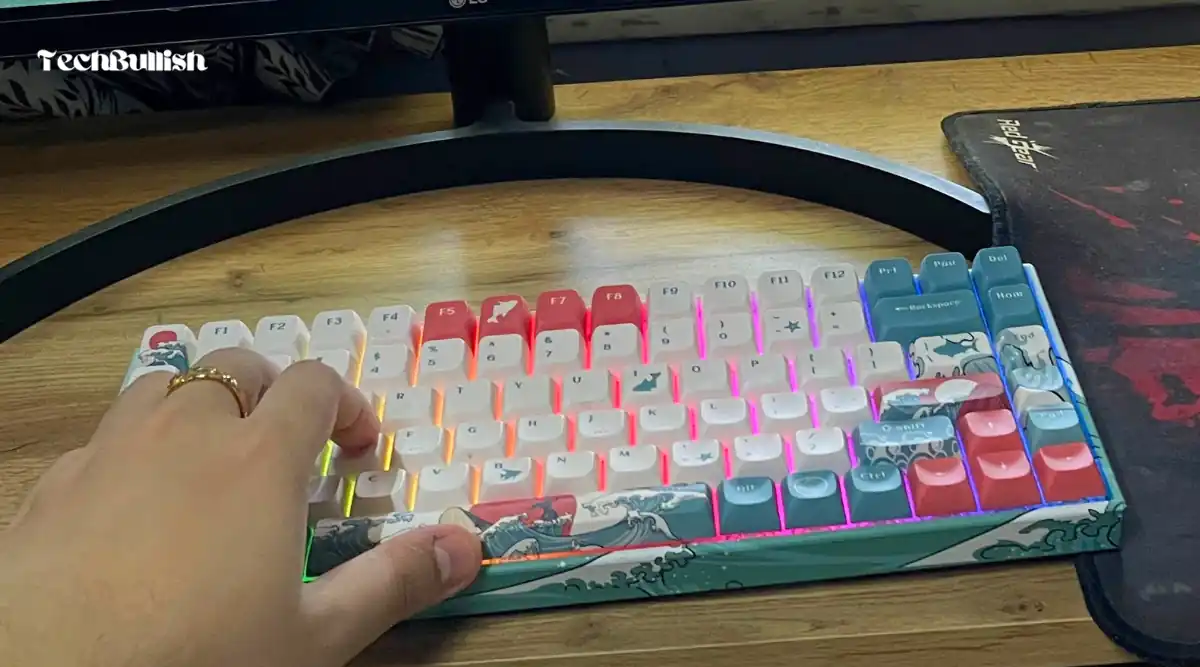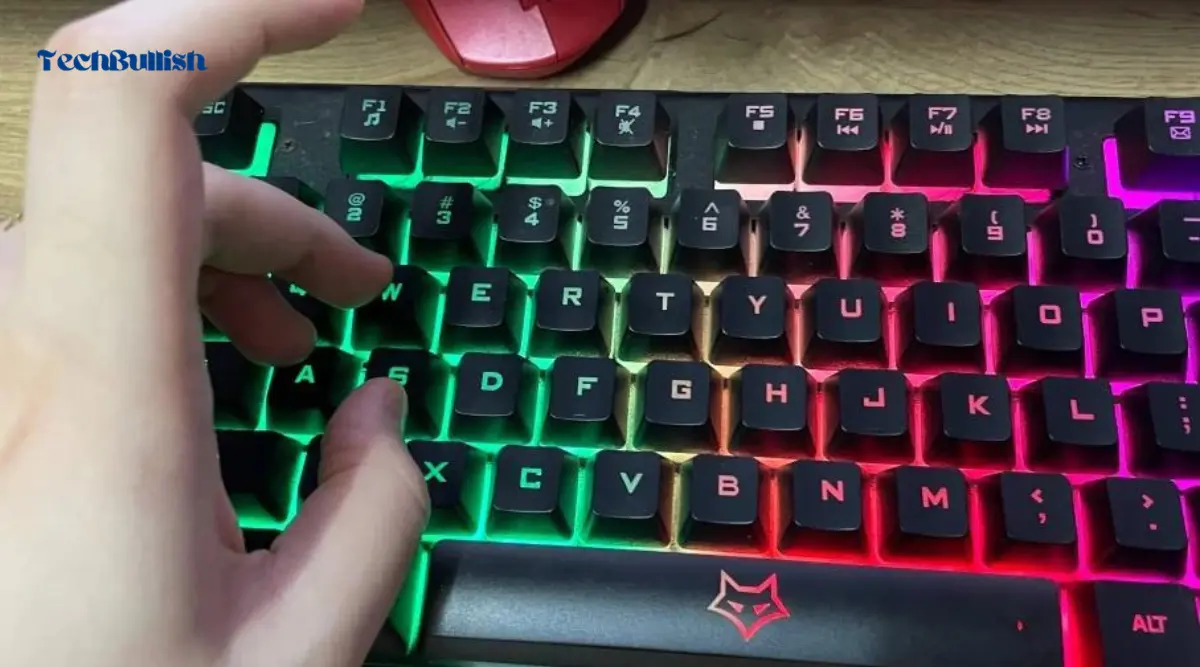When it comes to choosing a keyboard, there are a lot of options out there. Two of the most common types are mechanical and membrane keyboards. Both have their own unique features and benefits, making the choice between the two a matter of personal preference.
Mechanical keyboards are known for their tactile feedback and satisfying click sounds when keys are pressed. They use individual switches for each key, which can make them more durable and longer-lasting than membrane keyboards.
On the other hand, membrane keyboards use a rubber dome that sits under each key, which can make them quieter and less expensive. Understanding the differences between the two can help you choose the best keyboard for your needs.

Key Takeaways
- Mechanical keyboards provide tactile feedback and are more durable than membrane keyboards.
- Membrane keyboards are quieter and less expensive than mechanical keyboards.
- The choice between mechanical and membrane keyboards ultimately comes down to personal preference.
Mechanical Keyboard vs Membrane Keyboards Comparison
| Mechanical Keyboard | Membrane Keyboard |
| Offers a range of switch types for customization | Limited customization options |
| Removable keycaps for further customization | Some models offer customizable RGB lighting |
| Tactile feedback and clicky sound | Quieter and softer feel |
| May be preferred by heavy typists | May be preferred by those who prefer a lighter touch |
Understanding The Keyboards
When it comes to choosing a keyboard, there are two main types to consider: mechanical and membrane.
Both have their own unique characteristics and benefits, so it’s important to understand the differences between them before making your decision.
Mechanical Keyboards
Mechanical keyboards use individual switches for each key, which are activated when the key is pressed down.
These switches are typically made of metal and have a spring-loaded mechanism that provides tactile feedback and an audible click.
Mechanical keyboards are known for their durability, long lifespan, and customizable switch options.
There are several types of mechanical switches available, each with its own unique characteristics.
Some are designed for gaming, while others are better suited for typing. Popular mechanical switch brands include Cherry MX, Gateron, and Kailh.
Membrane Keyboards
Membrane keyboards, on the other hand, use a rubber dome or membrane to connect the key to the circuit board. When a key is pressed, the rubber dome collapses and makes contact with the circuit board, registering the keypress.
Membrane keyboards are known for being quieter and more affordable than mechanical keyboards.
There are also different types of membrane switches available, including dome switches, scissor switches, and rubber dome switches.
While not as customizable as mechanical switches, membrane switches can still provide a comfortable and reliable typing experience.
Keycaps and Switch Types
Another important factor to consider when choosing a keyboard is the keycap and switch type. Keycaps are the physical keys that you press, and they can come in different shapes, sizes, and materials. Some keycaps are designed for improved grip, while others are backlit for easier typing in low light environments.
Switch type refers to the mechanism that connects the keycap to the circuit board. Mechanical switches are typically more precise and responsive than membrane switches, but they can also be louder and more expensive. Membrane switches are quieter and more affordable, but they may not provide the same level of control and feedback as mechanical switches.
Mechanical Keyboards
If you’re looking for a keyboard that offers a tactile and responsive typing experience, then a mechanical keyboard might be the right choice for you.

Mechanical keyboards are different from membrane keyboards in that they use individual switches for each key, each with its own mechanism for registering a keystroke.
In this section, we’ll take a closer look at the features, advantages, and disadvantages of mechanical keyboards, as well as some popular brands to consider.
Features of Mechanical Keyboards
One of the most notable features of mechanical keyboards is their tactile feedback. This feedback comes from the switch mechanism, which provides a physical response when a key is pressed.
Mechanical keyboards also tend to be more durable than membrane keyboards, thanks to their individual switches and sturdier construction.
Additionally, many mechanical keyboards offer customization options such as RGB lighting and media controls.
Advantages of Mechanical Keyboards
Mechanical keyboards offer several advantages over membrane keyboards.
For one, they provide a more satisfying typing experience thanks to their tactile feedback and smoother switch actuation.
They also tend to be more durable and longer-lasting than membrane keyboards, making them a better investment in the long run.
Additionally, many mechanical keyboards offer n-key rollover, which means that each key press is registered independently, allowing for faster and more accurate typing.
Disadvantages of Mechanical Keyboards
One of the main disadvantages of mechanical keyboards is their price point. They tend to be more expensive than membrane keyboards, which can be a barrier for some users.
Additionally, mechanical keyboards tend to be louder than membrane keyboards, which can be a concern in shared spaces.
Finally, not all users prefer the tactile feedback of mechanical switches, and some may find them too “clicky” for their liking.
Popular Brands of Mechanical Keyboards
If you’re in the market for a mechanical keyboard, there are several brands to consider. Some of the most popular include:
- Logitech: Logitech offers a range of mechanical keyboards, from budget-friendly options to high-end gaming keyboards.
- Corsair: Corsair is another popular brand for gaming keyboards, with a range of options for different preferences and budgets.
- Razer: Razer is known for their high-end gaming peripherals, including mechanical keyboards with customizable RGB lighting and tactile switches.
To explore in more detail about the best mechanical keyboard brands, you can check this post.
Overall, mechanical keyboards offer several benefits over membrane keyboards, including a more satisfying typing experience, greater durability, and customization options. However, they do come with a higher price point and may not be suitable for all users.
If you’re in the market for a mechanical keyboard, consider your preferences and needs before making a purchase.
Membrane Keyboards
If you are looking for a budget-friendly keyboard, then a membrane keyboard might be the right choice for you.
Membrane keyboards are more affordable than mechanical keyboards, making them a popular option for those who are on a tight budget.

Features of Membrane Keyboards
Membrane keyboards are made up of several layers of rubber-like membranes that have conductive traces printed on them.
When you press a key, the membrane collapses and makes contact with the circuit board underneath, registering the keystroke. Membrane keyboards also have a softer typing feel compared to mechanical keyboards.
Advantages of Membrane Keyboards
One of the main advantages of membrane keyboards is that they are more affordable than mechanical keyboards.
They are also quieter, making them a good choice for those who don’t want to disturb others while typing. Membrane keyboards are also more portable and lightweight compared to mechanical keyboards.
Disadvantages of Membrane Keyboards
One of the disadvantages of membrane keyboards is that they have a mushy feel when typing. They also lack the tactile feedback that mechanical keyboards provide.
Membrane keyboards are not as durable as mechanical keyboards and may need to be replaced more frequently. Additionally, customization options for switches and keycaps are limited with membrane keyboards.
So, membrane keyboards are a more affordable and quieter option compared to mechanical keyboards. They have a softer typing feel, but lack the tactile feedback of mechanical keyboards. Membrane keyboards are a good option for those who are on a budget and don’t require the durability and customization options of mechanical keyboards.
Mechanical vs Membrane Keyboards for Gaming
When it comes to gaming, having the right keyboard can make all the difference. Mechanical and membrane keyboards are the two main types of keyboards available on the market.
Each has its own set of advantages and disadvantages, so it’s important to know the differences between the two before making a purchase.
Mechanical Keyboards for Gaming
Mechanical keyboards are known for their tactile feedback and clicky sound. They use individual mechanical switches for each key, which means that each key has its own switch.
This allows for faster response times and more accurate key presses. Mechanical keyboards are also known for their durability and longevity, as they can last for years without needing to be replaced.
For gamers, mechanical keyboards are often the preferred choice. They offer anti-ghosting, which means that multiple key presses can be registered at the same time without any input lag. This is especially important for fast-paced games where quick reflexes are necessary.
Mechanical keyboards also offer a higher level of customization, with many different types of switches available to choose from. Each switch has a different feel and sound, so gamers can choose the one that best suits their preferences.
Membrane Keyboards For Gaming
Membrane keyboards, on the other hand, use a rubber membrane to register key presses. They are typically quieter and less expensive than mechanical keyboards. Membrane keyboards are also more resistant to spills and dust, which can be a plus for gamers who tend to snack while playing.
However, membrane keyboards do not offer the same level of tactile feedback as mechanical keyboards. They also tend to wear out more quickly, with the rubber membrane eventually becoming less responsive over time.
Membrane keyboards also do not offer anti-ghosting, which can be a disadvantage for gamers who need to press multiple keys at once.
Which is Better for Gaming?
Ultimately, the choice between a mechanical and membrane keyboard comes down to personal preference.
Gamers who prioritize speed and accuracy may prefer a mechanical keyboard, while those who want a quieter and more affordable option may opt for a membrane keyboard.
It’s important to consider factors such as anti-ghosting, customization options, and durability when choosing a gaming keyboard. Ultimately, the best keyboard for gaming is the one that feels comfortable and natural to use, and that helps you perform at your best.
Personal Preference and Customization
When it comes to choosing between a mechanical and membrane keyboard, personal preference is a significant factor. Some people prefer the tactile feedback and clicky sound of mechanical keyboards, while others prefer the quieter and softer feel of membrane keyboards.
One aspect of personal preference is the customization options available with mechanical keyboards. Mechanical keyboards offer a range of switch types, each with a different feel and sound.
You can choose a switch type that suits your typing style and preferences, whether you prefer a light touch or a heavy one. Additionally, mechanical keyboards often have removable keycaps, allowing you to customize the look and feel of your keyboard even further.
On the other hand, membrane keyboards lack this level of customization. However, some membrane keyboards do offer customizable RGB lighting, which can be a fun way to add a personal touch to your keyboard.
Ultimately, your personal preference will depend on your typing style, the sound you prefer, and the level of customization you desire. It’s worth trying out both mechanical and membrane keyboards to see which one feels more comfortable to you.
So, Which is better for you, a Mechanical or a Membrane keyboard?
When it comes to choosing between a mechanical and a membrane keyboard, the decision ultimately comes down to personal preference and budget.
Mechanical keyboards offer a longer lifespan and better durability compared to membrane keyboards. They provide a more precise and responsive typing experience, making them a popular choice for gamers and professionals who require fast and accurate typing.
Mechanical keyboards also have more customization options for switches and keycaps, allowing users to tailor their typing experience to their individual preferences.
On the other hand, membrane keyboards are more affordable and offer a quieter typing experience. They have a “mushy” feel and lack key rollover, which can make them less suitable for gaming or typing-intensive tasks. However, they can be a good choice for those on a budget or who prefer a quieter typing experience.
It’s important to keep in mind that not all mechanical or membrane keyboards are created equal. There are a variety of factors to consider, such as switch type, keycap material, and build quality, which can affect the overall typing experience.
Ultimately, the best way to determine which type of keyboard is right for you is to try them out for yourself.
Consider visiting a store or trying out a friend’s keyboard before making a purchase. With a little research and experimentation, you’ll be able to find the perfect keyboard to suit your needs and preferences.
Frequently Asked Questions
What are the advantages of using a mechanical keyboard over a membrane keyboard?
What are the disadvantages of using a membrane keyboard?
Are mechanical keyboards really better than membrane keyboards?
What is the difference between a mechanical keyboard and a gaming keyboard?
Which type of keyboard is better for gaming: mechanical or membrane?

I’m Anirban Saha, Founder & Editor of TechBullish. With a B.Tech in Electronics and Communication Engineering, and 5+ years of experience as a software developer, I have expertise in electronics, software development, gadgets, and computer peripherals. I love sharing my knowledge through informational articles, how-to guides, and troubleshooting tips for Peripherals, Smart TVs, Streaming Solutions, and more here. Check Anirban’s Crunchbase Profile here.
